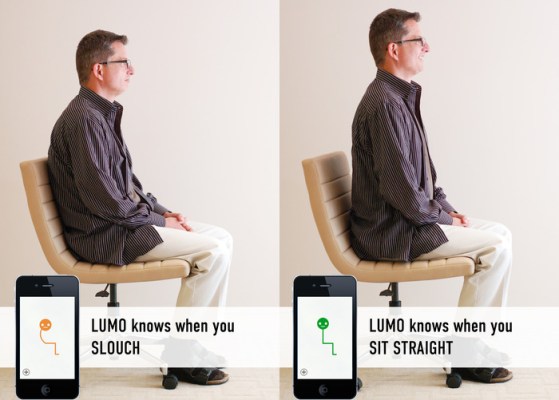The quantified self movement is in full force, and SF-based LUMO BodyTech is one of the beneficiaries of this trend. The smart sensor maker, whose first product LUMOback is designed to help improve a user’s posture via a smartphone app and activity/movement monitoring, got an early jump via Kickstarter, but has now turned to traditional investors including Madrona Venture Group, Eric Schmidt and Jerry Yang.
LUMOback is now shipping out to early Kickstarter backers, after having reached more than double its $100,000 funding goal on the crowdfunding site. The sensor was designed by Monisha Perkash and her co-founders Charles Wang and Andrew Chang. Between them, they share electrical engineering expertise, business chops and experience in electrical engineering and human/technology interaction. The LUMOback itself is a wearable sensor that fits across the lower back, and both gathers data about your movement throughout the day, and also provides gentle reminders via physical vibration to correct slouching.
A companion app provides visual feedback about your posture and healthy via an avatar which mirrors your own movements, and provides cumulative, quantified data covering your activity for the day, and how much you spent in various states, including walking, running, slouching and sitting. The LUMOback itself communicates with your device via Bluetooth 4.0 for low energy consumption, so it’ll only work with the iPhone 4S or later, or the iPad third generation and beyond. The sensor works independent of the app, but can connect to it at any time to transfer and help track data.
The company wants to pursue a more general goal of helping to “create a healthier society,” Perkash said in a statement. LUMOback is the first such product and app from the LUMO BodyTech brand, and likely won’t be the last. The company says it hopes to use the new $5 million in funding to “accelerate investments in sales and marketing, product development and engineering.”
As a larger trend, the quantified self movement is clearly seeing a lot of uptake among consumers. A lot of major health and fitness brands are now fully engaged in this space, including Nike, and smaller companies like Fitbit have seen considerable success with devices that help users track their activity. Smartphones and Bluetooth 4.0 will only help accelerate this trend, so expect to see more deals like this one go down, especially when the people involved can take to Kickstarter and ship a product to prove they’re serious to investors hesitant to touch an early-stage hardware startup.
